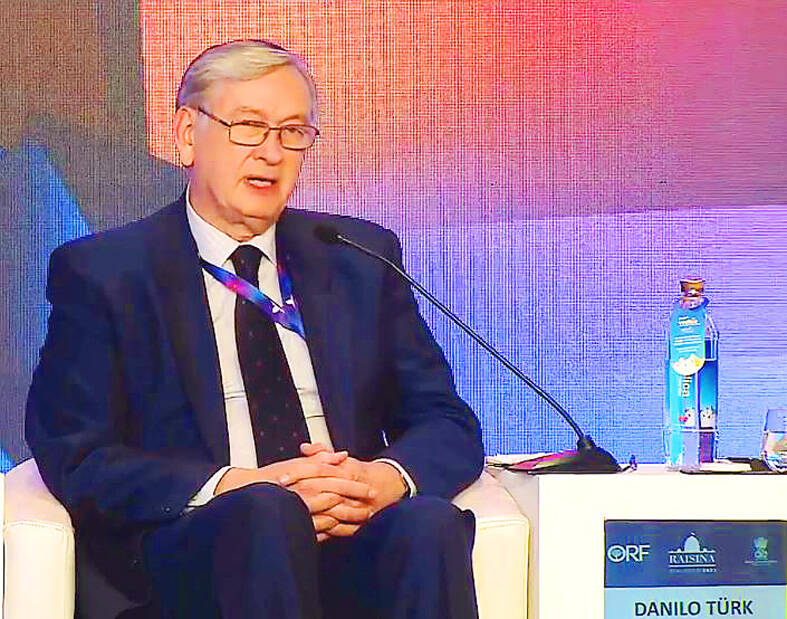An armed conflict across the Taiwan Strait is not inevitable, former Slovenian president Danilo Turk told the Raisina Dialogue conference in New Delhi.
The annual conference, which was held over three days and ended on Saturday, was organized by the Indian Ministry of External Affairs and New Delhi-based Observer Research Foundation think tank.
During a session on Saturday titled “The Strategic Poser: Dragon’s Manoeuvre in the Taiwan Strait,” six panelists discussed the possibility of China launching a military campaign against Taiwan and its timetable for doing so.

Photo: Screen grab from Raisina Dialogue conference livestream
Turk called on the global community to explore a path to a peaceful resolution of cross-strait tensions and avoid looking for solutions through military strategizing.
The global effects of a Chinese invasion “would be profound,” as a substantial part of global foreign trade would be halted, former Swedish prime minister Carl Bildt said.
China would not conduct an invasion “without very, very thoughtful preparations,” given the consequences to China and the world at large, Bildt said.
German lawmaker Peter Beyer said that the world should not speculate about the timetable of a possible Chinese invasion, but should be prepared as China “is very concretely preparing for a military invasion of Taiwan,” adding that an invasion could be possible “within the next two to five years.”
Germany sent a brigade to the South China Sea “to show solidarity with Taiwan” and like-minded countries in the region in response to China’s increased military presence, Beyer said.
He called on Germany to continue its solidarity with Taiwan by having the country’s lawmakers and business representatives frequently visit Taiwan.
Former Indian ambassador to Japan Sujan Chinoy cited Chinese President Xi Jinping’s (習近平) “Chinese Dream” and the two centenary goals Beijing proposed in 2017 as indications that China would attempt unification with Taiwan by 2049, the 100th anniversary of the People’s Republic of China.
However, Chinoy voiced doubts about an invasion of Taiwan, as it would be “likely to derail China’s own economic trajectory” and result in international sanctions.
An economic embargo or blockade would be one tactic China could use in preparation for or in conjunction with air and naval attacks, Chinoy said.
The US, Japan and Australia are certain to become involved in such a scenario, he added.
If Taiwan were to declare independence, “that would be a clear red line” for China, Shangri-La Dialogue senior fellow for Asia-Pacific Security Lynn Kuok said.
The ambiguity of China’s “Anti-Secession” Law, enacted in 2005, provides flexibility for Beijing to determine the circumstances in which it could justify an invasion of Taiwan, she said.

Taiwan is stepping up plans to create self-sufficient supply chains for combat drones and increase foreign orders from the US to counter China’s numerical superiority, a defense official said on Saturday. Commenting on condition of anonymity, the official said the nation’s armed forces are in agreement with US Admiral Samuel Paparo’s assessment that Taiwan’s military must be prepared to turn the nation’s waters into a “hellscape” for the Chinese People’s Liberation Army (PLA). Paparo, the commander of the US Indo-Pacific Command, reiterated the concept during a Congressional hearing in Washington on Wednesday. He first coined the term in a security conference last

Prosecutors today declined to say who was questioned regarding alleged forgery on petitions to recall Democratic Progressive Party (DPP) legislators, after Chinese-language media earlier reported that members of the Chinese Nationalist Party (KMT) Youth League were brought in for questioning. The Ministry of Justice Investigation Bureau confirmed that two people had been questioned, but did not disclose any further information about the ongoing investigation. KMT Youth League members Lee Hsiao-liang (李孝亮) and Liu Szu-yin (劉思吟) — who are leading the effort to recall DPP caucus chief executive Rosalia Wu (吳思瑤) and Legislator Wu Pei-yi (吳沛憶) — both posted on Facebook saying: “I

The Ministry of Economic Affairs has fined Taobao NT$1.2 million (US$36,912) for advertisements that exceed its approved business scope, requiring the Chinese e-commerce platform to make corrections in the first half of this year or its license may be revoked. Lawmakers have called for stricter enforcement of Chinese e-commerce platforms and measures to prevent China from laundering its goods through Taiwan in response to US President Donald Trump’s heavy tariffs on China. The Legislative Yuan’s Finance Committee met today to discuss policies to prevent China from dumping goods in Taiwan, inviting government agencies to report. Democratic Progressive Party Legislator Kuo Kuo-wen (郭國文) said

The Ministry of Economic Affairs has fined Taobao NT$1.2 million (US$36,900) for advertisements that exceeded its approved business scope and ordered the Chinese e-commerce platform to make corrections in the first half of this year or its license would be revoked. Lawmakers have called for stricter supervision of Chinese e-commerce platforms and more stringent measures to prevent China from laundering its goods through Taiwan as US President Donald Trump’s administration cracks down on origin laundering. The legislature’s Finance Committee yesterday met to discuss policies to prevent China from dumping goods in Taiwan, inviting government agencies to report on the matter. Democratic Progressive Party